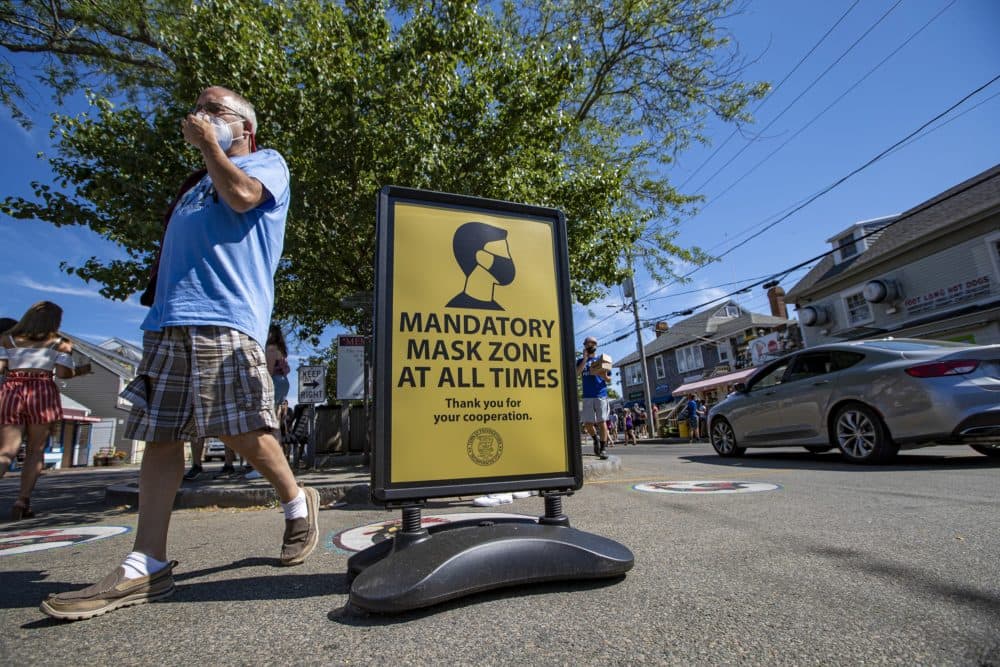Advertisement
Provincetown Data Suggests Vaccines Protect Against Complications, But Not Delta Transmission

First it was “Independence Week” in Provincetown that packed the place from June 29 to July 5. Shortly after that, more descended on the quaint Massachusetts town for “Bear Week.” People crowded in pools, restaurants and bars. After a year of canceled celebrations, people were understandably excited to drink, revel and relax under the relative security of a highly vaccinated population.
Instead, an outbreak stemming out of Provincetown is casting doubt on the vaccine’s ability to halt transmission of the delta variant of the coronavirus. An epidemiological investigation of the outbreak released Friday by the Centers for Disease Control and Prevention and the Department of Public Health shows that the vast majority of cases from that outbreak were in fully vaccinated individuals. Only a few of those cases led to hospitalization, showing that the vaccine is still exceedingly effective at preventing serious illness.
“This is really kind of a watershed moment in the pandemic,” says Dr. Jacob Lemieux, an infectious disease physician at Massachusetts General Hospital and an genomic epidemiologist who didn’t work on the investigation. “It’s a wake-up call as to how transmissible the delta variant is, and a reality check on what the vaccines can do but also what some of their limitations are.”
Just as Provincetown’s Bear Week kicked off, reports of symptomatic cases in fully vaccinated individuals — known as breakthrough cases — began flowing into the Massachusetts Department of Public Health.
“They were hearing about an uptick in cases in fully vaccinated individuals,” says Bronwyn MacInnis, the director of pathogen genomic surveillance at the Broad Institute of MIT and Harvard. She worked on the CDC and DPH investigation. “The state reached out to [my lab] to help with understanding it. The first two questions were: is it delta? And is it just the delta we know or is there something else at play here?”
State and local health departments increased testing in Provincetown once cases began piling up, and those samples wound up at the Broad Institute for genetic sequencing. First, MacInnis found the Delta variant caused the overwhelming majority of cases — more than 90% — in Provincetown, and it seemed to have entered the area from multiple sources. She says they also haven’t found any special mutations that might suggest a new strain in this cluster.
“We have looked closely at the spike and more broadly across the genome,” MacInnis says. “So far, we don’t see anything particularly unique about the delta variants that are driving these infections. That, I guess, was at least reassuring to that point.”
The next step is to see if any of the vaccinated individuals who got COVID were able to transmit the virus to one another and how many, if any, will develop serious complications or die. Although there isn’t hard evidence to answer either question just yet, scientists can make some educated guesses based on the data they have thus far.
For one, the amount of viral particles in both vaccinated and unvaccinated people who contracted the delta variant was both similar and extremely high compared to the ancestral coronavirus. Plus, 75% of the 469 COVID patients in this investigation were fully vaccinated. MacInnis says that suggests that not only is the delta variant highly transmissible, but vaccinated people can pass it on to each other.
“The vaccines are clearly not a force field,” says MGH’s Lemieux. “There are some things that are fine — eating outdoors, being outside in highly ventilated places while vaccinated. But dense indoor gatherings, those kinds of activities may not be completely safe even among vaccinated people. I think it’s a paradigm shift and forces us to reorient around the new reality in the era of delta.”
So far, though, there have only been five hospitalizations associated with the Provincetown cases — including four vaccinated people. There haven’t been any deaths, and Lemieux says that might not be true if so many people weren’t vaccinated. Lemieux also doesn’t expect there to be many deaths among vaccinated people, either.
“The vaccines are clearly excellent at preventing severe disease. We’re just not seeing the rates of hospitalization and death that we might have been seeing if the vaccines hadn’t been rolled out successfully,” he says.
That means the best way to continue protecting yourself is to get vaccinated, Lemieux says. After analyzing the data from Provincetown, the CDC and the Massachusetts DPH began recommending that vaccinated people begin masking and distancing again indoors in certain scenarios — including if you live in an area with heightened COVID transmission.
But there are questions that scientists don’t have a good grasp on just yet, like what exactly about the delta variant makes it so transmissible and spread so ferociously even among fully vaccinated individuals.
Was it simply that the Provincetown themed weeks had settings where one could not spin in a circle without touching another dancing human being? Or does the delta variant cause people to shed such massive volumes of virus that it overwhelms the protection of the vaccine, like holding an umbrella in a hurricane? Could there be special mutations on the strain that help it evade the vaccine or increase its power some other way?
“We’re quite confident about [mutations] actually, but what are the mutations that confer this property of increased transmissibility?” Lemieux says. “We don’t fully understand.”
